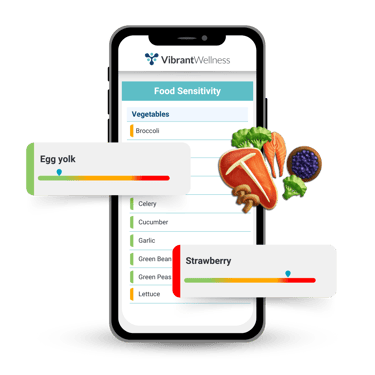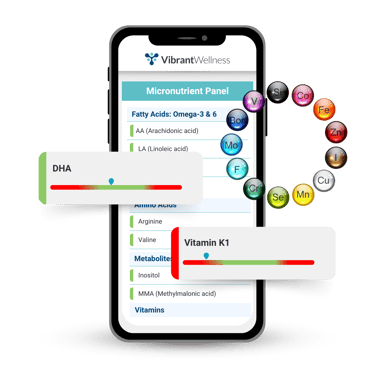Personalized Nutrition: Tailoring Your Diet for a Thriving Microbiome
One-size-fits-all is failing our gut.
Despite the flood of trending diets—from keto to vegan to intermittent fasting—many patients still report persistent symptoms like bloating, fatigue, brain fog, resistant weight gain, and inflammatory conditions. As healthcare providers, we know these generalized recommendations often fall short because they fail to account for one critical variable: the individual.
In reality, what heals one gut may harm another, and the best diet for microbiome balance differs for different patients.
With its foundation of functional testing and individualized assessment, personalized nutrition offers a pathway to target root causes, optimize the gut microbiome, and support long-term resilience and cognitive performance.
Table of Contents
Why Personalized Nutrition Is Foundational to Gut and Cognitive Health
The gut microbiome contains trillions of bacteria, viruses, and fungi. This dynamic ecosystem varies significantly between individuals. Even people who eat identical foods can provoke highly variable glycemic and inflammatory responses depending on their microbial composition and metabolic context.
Food sensitivities and the gut impact more than just gastrointestinal health, and it starts with the gut-brain axis. This two-way communication system between gut and brain involves microbial metabolites, the vagus nerve, and immune signaling. As a result, gut health is directly tied to cognitive function, mood stability, and stress resilience.
 Digestive health and executive function are related, too. Executive function is a suite of cognitive processes, including working memory, flexible thinking, and self-control, and it is highly susceptible to systemic inflammation and nutrient availability. Deficiencies in these skills can impair time management, planning, and focus, with profound consequences in both professional and personal life.
Digestive health and executive function are related, too. Executive function is a suite of cognitive processes, including working memory, flexible thinking, and self-control, and it is highly susceptible to systemic inflammation and nutrient availability. Deficiencies in these skills can impair time management, planning, and focus, with profound consequences in both professional and personal life.
Encouragingly, research shows that diets rich in prebiotics, probiotics, polyphenols, and fiber enhance executive function and emotional regulation. Diets high in refined carbohydrates, industrial oils, and additives disturb microbial diversity, promote gut permeability, and contribute to neuroinflammation.
For these reasons, we must abandon the all-too-easy, “one-size-fits-all” approach; nutrition for gut health must evolve beyond broad guidelines and instead reflect the unique biological blueprint of each individual.
The Role of Functional Testing in Customizing Nutrition Plans
Functional testing is a crucial first step in delivering effective personalized nutrition to your patients. It allows you to bypass guesswork and ground clinical decisions in objective data, illuminating how an individual’s microbiome, nutrient status, and metabolic pathways are functioning.
According to recent studies, integrating gut microbiota profiles with genetic and metabolic data leads to more effective dietary interventions, improving both microbial diversity and patient health outcomes.
 Dysbiosis, micronutrient depletion, impaired detox pathways, and hormone imbalances are all interconnected. When you address them simultaneously through individualized plans based on functional gut testing, benefits include optimized:
Dysbiosis, micronutrient depletion, impaired detox pathways, and hormone imbalances are all interconnected. When you address them simultaneously through individualized plans based on functional gut testing, benefits include optimized:
- Cognitive function
- Mood regulation
- Stress resilience
- Metabolic flexibility
- Hormonal balance
As one recent study noted, personalized nutrition strategies that consider both the patient genome and gut microbiota composition are the future of preventive and therapeutic care. And for your patients who don't know how to support a healthy microbiome, it starts with functional testing.
Learn about the role of gut health in executive function in this blog post.
Key Tests to Customize Nutrition Plans
Key functional tests to personalize nutrition strategies include:
The Vibrant Wellness Gut Zoomer
The Gut Zoomer evaluates over 170 bacterial species, parasitic organisms, yeasts, viruses, and functional markers of gut health, including beta-glucuronidase, calprotectin, and zonulin.
The Vibrant Wellness Micronutrient Panel
The Micronutrient Panel measures intra- and extracellular levels of vitamins, minerals, amino acids, and antioxidants essential for gut lining repair, neurotransmitter synthesis, and mitochondrial function.
The Vibrant Wellness Food Sensitivity Test Complete
The Food Sensitivity Test Complete assesses IgG reactivity to 209 foods and additives, helping uncover hidden inflammatory drivers that may disrupt gut integrity and systemic balance.
The Vibrant Wellness NutriPro Test
The NutriPro test screens for genetic polymorphisms that can affect nutrient metabolism (e.g., MTHFR, PEMT), detoxification capacity, and macronutrient processing, providing deep insights into personalized dietary needs.
The Vibrant Wellness Hormone Zoomer
The Hormone Zoomer assesses reproductive and adrenal hormones, hormone metabolites, and environmental exposures that may impair endocrine function.

Real-World Applications: Personalized Nutrition in Clinical Practice
As the evidence for microbiome-driven health continues to grow, translating these insights into clinical practice is essential. From metabolic dysfunction and cognitive fatigue to hormonal imbalance, personalized nutrition enables you to identify and address root causes rather than merely managing symptoms.
The following case studies illustrate how integrating functional testing, including the Gut Zoomer, Hormone Zoomer, Food Sensitivity Complete, and NutriPro, with individualized nutrition strategies can yield measurable and sustainable outcomes.
These cases echo recent findings that person-specific microbiome data and dietary inputs may be used to modulate systemic inflammation, metabolic function, and even behavior and cognition.
Case Study 1: The “Healthy Eater” Executive with Chronic Bloating and Fatigue
Client Profile:
Lena, a 51-year-old CFO, reported daily bloating, mid-afternoon fatigue, and a creeping sense of cognitive dullness. Her mostly plant-based, gluten-free, low-sugar diet—once energizing—was now failing her.
Functional Testing Results:
- Gut Zoomer: Low microbial diversity; elevated Methanobrevibacter smithii (linked to methane-dominant SIBO and bloating); elevated calprotectin and zonulin
- Food Sensitivity Test: Reactivity to chickpeas, almonds, and spinach (which she ate daily)
- Micronutrient Panel: Low intracellular magnesium, vitamin B12, and zinc
Clinical Insight:
Lena’s high-fiber plant foods were feeding fermenters and triggering reactivity. Mildly elevated beta-glucuronidase pointed to sluggish estrogen detox, common in peri-menopausal women.
Intervention:
Temporarily eliminated reactive foods, supported butyrate production through resistant starches, and supplemented with a broad-spectrum probiotic and magnesium glycinate. Within six weeks, her energy stabilized and bloating resolved. At three months, microbial diversity had improved, and cognitive sharpness returned.
This case exemplifies the importance of testing rather than assuming dietary virtue equals functional wellness.
Case Study 2: The Overwhelmed Teacher with Brain Fog and Weight Resistance
Client Profile:
Michael, 38, struggled with brain fog, poor motivation, and stagnant weight loss despite clean eating and exercise. His typical meals included oats, eggs, whey protein, and dairy.
 Functional Testing Results:
Functional Testing Results:
- NutriPro: Variants in MTHFR and PEMT, impairing methylation and choline production; poor saturated fat metabolism
- Food Sensitivity Test: Reactivity to oats, egg whites, and casein
- Gut Zoomer: Low Akkermansia muciniphila and Faecalibacterium prausnitzii; elevated zonulin
Clinical Insight:
Michael’s “healthy staples” were driving inflammation. Genetic impairments limited detoxification, and dysbiosis was compounding mood and metabolic issues.
Intervention:
Eliminated reactive foods, replaced whey protein with hemp and collagen, added methylated B vitamins, and introduced prebiotics for Akkermansia support. At four weeks, mental clarity improved. By month three, he had lost 12 lbs without reducing calories.
This case highlights how even non-obese clients can suffer from hidden metabolic inflexibility driven by food sensitivity, dysbiosis, and poor nutrient activation.
Case Study 3: PCOS, Hormonal Imbalance, and Gut Dysfunction in a Busy Professional
Client Profile:
Nadia, 34, was recently diagnosed with PCOS. Symptoms included acne, irregular cycles, bloating, sugar cravings, and difficulty losing weight despite high physical activity.
- Hormone Zoomer: Elevated androgens; low estradiol; impaired estrogen metabolism; elevated cortisol; BPA and phthalate metabolites present
- Gut Zoomer: Dysbiosis with Proteobacteria and Candida overgrowth; elevated beta-glucuronidase
- Micronutrient Panel: Low zinc, chromium, and magnesium—key cofactors in insulin signaling
Clinical Insight:
Although we usually associate high beta-glucuronidase with estrogen recirculation and elevated hormone levels, Nadia's low estradiol indicated suppression at the production level, likely from chronic stress and endocrine disruption. Elevated beta-glucuronidase reflected microbial imbalance rather than estrogen load.
Intervention:
Removed endocrine disruptors, supported detox with calcium-D-glucarate and DIM, implemented anti-fungal protocols, and replenished minerals. Also added myo-inositol to support ovulatory function.
At three months, her acne cleared, mood stabilized, and cycles returned. Follow-up testing showed improved estrogen metabolism and lowered beta-glucuronidase.
Dig deeper: learn how lifestyle strategies can support (or harm) gut health.
Data-Driven Nutrition as the Future of Gut and Cognitive Health
The field of personalized nutrition is rapidly evolving. As we deepen our understanding of how the gut microbiome shapes systemic health, two things become clear: generic dietary advice is no longer sufficient, and functional medicine and gut health go hand in hand.
Using functional testing to tailor nutrition to each individual's microbiome, genetic blueprint, nutrient needs, and metabolic flexibility enables you to move beyond symptom management to true health optimization.
By addressing the gut-brain axis, nutrient imbalances, food sensitivities, and hormonal disruption, clinicians can help patients achieve:
- Improved cognitive resilience
- Stable mood and emotional regulation
- Enhanced metabolic health
- Better stress tolerance
- Optimized endocrine function
The research is clear: Personalized, microbiome-informed nutrition is a critical lever in preventing and reversing chronic disease.
Clinical Takeaways for Healthcare Providers
- Test, Don’t Guess:
Incorporate tools like Gut Zoomer, Hormone Zoomer, Food Sensitivity Testing, and NutriPro to illuminate underlying dysfunctions rather than relying solely on symptom reports. - Target the Microbiome Thoughtfully:
Not all probiotics, fibers, or fermented “gut health” foods are universally beneficial. Personalize interventions based on microbial composition and tolerance. - Monitor and Adjust Continuously:
The gut microbiome and systemic metabolism are dynamic. Nutritional plans must evolve based on retesting, patient feedback, and shifting health goals. - Empower Clients Through Education:
Patients are increasingly seeking personalized, actionable information. Helping them understand the "why" behind their nutrition plan improves adherence, satisfaction, and long-term outcomes.

About the Author
Dr. Susan Lovelle, a former award-winning plastic surgeon, is the Founder of Balanced Performance, offering all-in-one lifestyle health solutions for busy executives and the innovative companies they lead. She specializes in boosting their energy, optimizing weight, and balancing hormones to unlock peak performance in every aspect of life. Dr. Susan has been featured on The Doctors, the docu-series Exhausted, Lifetime TV, Forbes, DWEN, and Good Morning Washington. Her book, Thrive! The Five-Week Guide to Mastering Your Energy At Any Age is available on Amazon.
Regulatory Statement:
The information presented in case studies have been de-identified in accordance with the HIPAA Privacy protection.
The general wellness test intended uses relate to sustaining or offering general improvement to functions associated with a general state of health while making reference to diseases or conditions. This test has been laboratory developed and its performance characteristics determined by Vibrant America LLC and Vibrant Genomics, a CLIA-certified and CAP-accredited laboratory performing the test. The lab tests referenced have not been cleared or approved by the U.S. Food and Drug Administration (FDA). Although FDA does not currently clear or approve laboratory-developed tests in the U.S., certification of the laboratory is required under CLIA to ensure the quality and validity of the test.

Dr. Susan Lovelle, MD

Find a Provider- Take Control of Your Health
Connect with a provider to access Vibrant Wellness specialty tests and personalized insights that support your long-term health.
Related Articles
What if you could harness a hidden player in the gut that predictably influences your patients’ response to hormone therapy? How would that impact them and your...

As a functional medicine nutritionist, I’ve reviewed hundreds of labs and seen firsthand how many health issues—especially those involving hormones—can be trace...

Hormone imbalances are among the most common complaints we hear as functional and integrative medical practitioners. However, many of us are missing a crucial p...






.png)